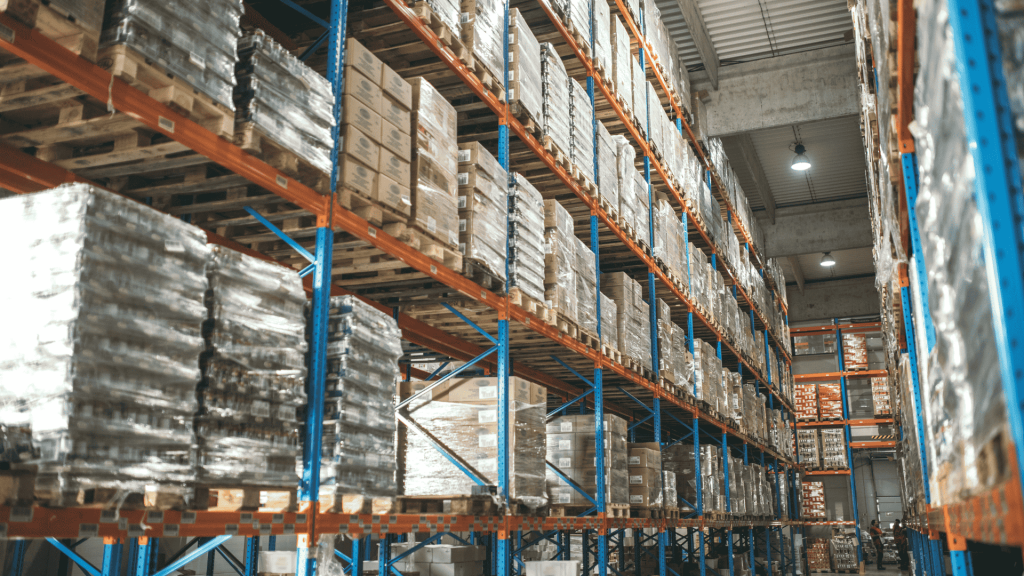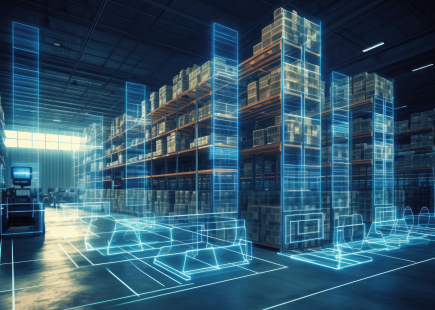Unleashing the Power of Customs Bonded Warehouses
03 July, 2023In the ever-evolving logistics landscape of the MEA region, the role of customs-bonded warehouses is often overlooked. In this post, we dive into the function of customs-bonded warehouses, the challenges they are helping to solve, and real-life examples to demonstrate their strategic value.

Understanding Customs-Bonded Warehouses
A customs-bonded warehouse is a secured facility regulated by the customs authority to store imported goods duty- and tax-free until they’re cleared for domestic use. These warehouses create a safe, controlled environment supervised by customs officials to maintain the safety and integrity of stored products.
Weighing Bonded Versus Non-Bonded Warehouses for Mission-Critical Spare Parts
When managing mission-critical spare parts, the decision between using a bonded or non-bonded warehouse is highly dependent on the manufacturers’ specific requirements. However, customs-bonded warehouses often prove to be a more advantageous option due to their cost savings, faster customs clearance, extended storage periods, and enhanced security measures. When comparing two types of warehouses, let’s check the most important criteria:
- Duty and Tax Suspension: One of the primary benefits of using a bonded warehouse is deferred payment of duties and taxes. In non-bonded warehouses, import duties and taxes are typically paid upon the arrival of goods. However, these payments are postponed in bonded warehouses until the goods are cleared for domestic use. This deferment allows manufacturers to temporarily ease financial obligations until the items are sold and released to the mainland, contributing to substantial cost savings. Moreover, when re-exporting the goods, these duties and taxes could be completely waived, further enhancing the financial benefits.
- Customs risks: Customs-bonded warehouses offer faster withdrawal of products or spare parts with minimized customs issues. These warehouses handle clearance inside the facility around the clock, which helps minimize the risk of paperwork errors, non-compliance, and unexpected customs delays that can occur when using a regular warehouse.
- Compliance: By storing products in a customs-bonded facility, businesses can save on compliance infrastructure investments. Regular warehouses are subject to various business regulations that vary based on location and warehouse type.
- Suitable scenario: Foreign companies who want to delay payment of duties and taxes until their products are sold may find a customs-bonded warehouse more suitable. Regular warehouses are better for local storage and movement of products without any restrictions.
The Significance of Customs-Bonded Warehouses in the MEA Region
In the complex landscape of the Middle East and Africa, customs-bonded warehouses are invaluable for manufacturers managing high-value equipment and time-sensitive spare parts. This importance stems from several unique characteristics and conditions of the region:
- Trade Facilitation: As a dynamic hub of international trade and commerce, the MEA region is equipped with bustling ports and airports, all facilitating the rapid movement of goods. Customs-bonded warehouses are instrumental in streamlining these import processes. They act as strategic pit-stops, allowing manufacturers to temporarily keep their goods before distributing them effectively across the region. By helping to orchestrate smoother product flow, they significantly aid in boosting the overall speed and efficiency of the supply chain.
- Regulatory Compliance: The MEA region is known for its intricate and often challenging customs procedures and regulatory requirements. Navigating these complexities can be daunting for manufacturers, especially those entering new markets. Here, customs-bonded warehouses help by offering a temporary storage solution. These warehouses allow manufacturers to safely store their products while they work through the legalities and procedural necessities. This ensures compliance with local regulations, facilitates faster customs clearance, and aids in avoiding penalties that could potentially derail operations.
- Re-export and Transshipment: Another point that defines the MEA region is its prominent role in re-export and transshipment activities. Goods often make temporary pit-stops in the region before being shipped to their final destinations. Customs-bonded warehouses perfectly cater to this need by allowing temporary storage of these goods. Manufacturers can consolidate, sort, and repackage their products in these warehouses before dispatching them for their onward journey. This helps in effective inventory management and significantly reduces the time and cost associated with multiple customs clearances.
By addressing these key logistical challenges, customs-bonded warehouses have become an essential element in the complex machinery of the MEA logistics landscape. They not only provide manufacturers with a means to manage their high-value goods more efficiently but also contribute to the broader objective of fostering seamless trade and commerce in the region.

MEA Countries Welcoming Bonded Warehouses
Numerous countries within the MEA region have recognized the immense benefits of customs-bonded warehouses, and, thus, have incorporated them into their trade infrastructures. In particular, the following countries demonstrate the wide acceptance and critical role of customs-bonded warehouses in facilitating trade, enhancing supply chain efficiency, and fostering economic growth:
- The United Arab Emirates (UAE), known for its vibrant trading hub, Dubai, where bonded warehouses support a robust import/export industry.
- Egypt, with its strategic geographical location bridging Asia and Africa, relying on bonded warehouses for efficient goods management.
- South Africa, at the heart of Africa’s bustling economic landscape, uses bonded warehouses to facilitate its diverse trading activities.
- Jordan, one of the trade gateways in the MEA, has harnessed the benefits of bonded warehouses for smoother trade operations.
- Morocco, a key player in North Africa’s trade ecosystem, embraces bonded warehouses to enhance its logistics and distribution capabilities.
Harnessing the Power of Bonded Warehouses: Insights from the UAE and Egypt
To shed light on the real-world benefits of bonded warehouses, let’s narrow our focus onto two markets in the MEA region – the United Arab Emirates (UAE) and Egypt. Each of these countries is effectively utilizing bonded warehousing to enhance their logistics:
Revamping Re-exports in Dubai
Dubai, a pivotal city within the UAE, presents unique opportunities for manufacturers by offering customs-bonded warehouses equipped with distinctive advantages:
- Seamless Re-export: In the bustling global trade hub of Dubai, bonded warehouses have simplified the traditionally complex process of re-exporting goods. Manufacturers can import products without the immediate payment of import duties and taxes. If these goods are then re-exported, these charges are completely waived, thereby facilitating a smoother and more cost-effective distribution process across the MEA market.
- Strategic Location: Straddling Asia, Europe, and Africa, Dubai’s advantageous position makes it an ideal logistics hub. Bonded warehouses in Dubai serve as centralized storage points, enabling manufacturers to manage their import and distribution operations efficiently. This strategic storage solution minimizes logistical hurdles and optimizes delivery routes, ensuring timely delivery of goods.
Streamlining Imports in Egypt
Egypt, another key player in the MEA region, offers additional benefits through its customs-bonded warehouses:
- Expedited Customs Clearance: Bonded warehouses in Egypt are designed to fast-track the customs clearance process. By minimizing customs delays, these facilities ensure quicker access to vital spare parts, enabling manufacturers to respond swiftly to market demands and reduce potential downtime.
- Value-Added Services: Egyptian bonded warehouses go beyond offering mere storage solutions. They provide additional services such as labeling, packaging, and sorting. These services enhance inventory management, improve product visibility, and streamline operations, significantly bolstering overall supply chain efficiency.
In both these dynamic markets, customs-bonded warehouses provide the infrastructure and services necessary to navigate the intricate logistics landscape of the MEA region effectively.

Benefits of Bonded Warehousing
Selecting customs-bonded warehouses as a storage solution for high-value equipment and time-sensitive spare parts brings forth a wide array of advantages, transforming logistical challenges into strategic opportunities:
- Cost Savings: As mentioned earlier, the most compelling benefit of using bonded warehouses is the deferred duty and tax payments. This deferment relieves manufacturers from the immediate financial burden typically associated with importing goods. Consequently, it allows for more effective resource allocation, freeing up capital that can be used in other critical business areas.
- Improved logistics: Customs-bonded warehouses are strategically located near ports and transportation hubs for efficient shipping of goods. This saves time and money on transportation expenses.
- Faster Customs–Clearance: When you store goods in a customs-bonded warehouse, they will be customs-cleared at the same facility. This means that manufacturers can save time and money, and reduce the risk of delays or complications when importing or exporting goods.
- Expert Inventory Management: Bonded warehouses provide enhanced inventory control, an essential element for effective supply chain management. By utilizing these facilities, manufacturers can efficiently maintain optimal stock levels, manage demand fluctuations, and substantially reduce the risk of stock-outs.
- Flexible Distribution: Bonded warehouses also enable strategic distribution planning. By allowing goods to be stored until the perfect moment for their release into the market, these warehouses help optimize delivery schedules and reduce transportation costs. Such flexibility in distribution can be crucial in a dynamic and fast-paced market environment.
- Improved Customs Compliance: Finally, operating within a bonded warehouse helps manufacturers ensure adherence to often complex customs regulations. Customs authorities closely monitor these facilities, thereby minimizing the risk of regulatory penalties or costly delays in the import process. This enhanced compliance can foster a smoother, more predictable trading experience, significantly reducing potential trade barriers.
These benefits, among others, provide a snapshot of the indispensable role of customs-bonded warehouses in optimizing logistics operations, ultimately driving growth and competitive advantage for businesses operating in the MEA region and beyond.
Case Study: Optimizing Imports in the MEA Region with Bonded Warehouses
Let’s examine how the benefits of bonded warehouses can be exploited using the example of a high-value medical equipment producer seeking entry into the MEA market. By adopting the usage of a bonded warehouse in Dubai, the company can import its products and service spare parts without immediate obligation for duties and taxes. The warehouse provides a secure location for storage while preparing the equipment for distribution across numerous MEA nations.
In this scenario, the bonded warehouse makes re-exporting the equipment to various countries in the region simpler. The producer can assemble and dispatch the products according to market demand, circumventing unnecessary expenses and delays associated with individual customs procedures.
Moreover, the strategic placement of the bonded warehouse in Dubai ensures efficient distribution to various MEA markets, trimming transportation costs and securing prompt availability of critical equipment when required.
Choose Pedigri for Your Bonded Warehouse Solutions
Pedigri Technologies has over 25 years of experience in providing faster product and spare parts delivery to the Middle East and Africa region. Our bonded warehouses in the UAE, Egypt, Jordan, and India optimize the service supply chain for high-value equipment manufacturers, resulting in more cost-efficient operations, faster go-to-market, and better field support. Contact us to learn more.
Latest news

Pedigri Technologies Achieves PCI DSS Certification
Pedigri Technologies is pleased to announce its successful attainment of PCI DSS (Payment Card Industry Data Security Standard) Level-1 compliance.

The AI Revolution in Spare Parts Inventory: Transforming Supply Chain Management
Imagine the chaos when a critical spare part is unavailable when needed most. It’s a familiar scenario to many leaders that still rely on outdated inventory management systems. But for those daring to venture into the new era of AI, the story unfolds quite differently.

The Imperative of Denied or Restricted Party Screening in Supply Chains
Imagine the supply chain as a complex network of blood vessels in a living organism. Just as the health of an organism depends on the purity of what flows through these vessels, so does the health of a supply chain rest on the integrity of its participants.
